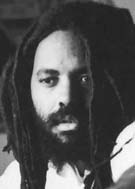![]()
Write us!
socialistviewpoint@pacbell.net
July/August 2004 • Vol 4, No. 7 •
Rich Man’s War
By Mumia Abu-Jamal
 The life experience of Sen. John Kerry, of a man of wealth entering the military, is a rarity, in this age, and in yesteryear. During the U.S. Civil War, rich men could, literally, buy their way out of the services. They paid several hundred dollars, and poor men, those many without funds, took their places on the battlefields, and in hundreds of thousands of graves. How things have changed; and how they haven’t. There is no draft today (yet). Indeed, the military propagandists boast that America fields an “all-volunteer” military. While it is true that there is not a draft, it is another matter to decide whether or not those who enlist in the military are actually voluntary.
The life experience of Sen. John Kerry, of a man of wealth entering the military, is a rarity, in this age, and in yesteryear. During the U.S. Civil War, rich men could, literally, buy their way out of the services. They paid several hundred dollars, and poor men, those many without funds, took their places on the battlefields, and in hundreds of thousands of graves. How things have changed; and how they haven’t. There is no draft today (yet). Indeed, the military propagandists boast that America fields an “all-volunteer” military. While it is true that there is not a draft, it is another matter to decide whether or not those who enlist in the military are actually voluntary.
Why do they ‘volunteer’?
For tens of thousands of young men and women, they enlisted in the only place they could to learn a marketable trade (like computer technology, or mechanics), or to earn enough dough to afford college. This is a class-draft; a draft by another name of those who are unable to navigate the civilian economy.
When you really look at it, the War in Iraq is ultimately a class war. Except the class that fights it didn’t decide to fight, and isn’t fighting in its own class interest. While doubtless some kids are motivated by slick commercials and calls to patriotic duty, it is virtually assured that for many young folks, if they were born into a family of means, their patriotism would be displayed by flags unfurled in their dorm rooms, or fluttering on the breeze outside their windows.
The example of Jesus Suarez del Solar is emblematic of many who have found themselves forced to join the Army to earn a decent living. Jesus, who wanted to finish high school, was promised $1,000 a month for school by a military recruiter. He signed up (although, according to his dad, he received only $620 after various deductions). His father, Fernando, told reporters, “My heart goes out to the soldiers, many of whom come from poor communities and joined the military as a way to get an education. Then they find themselves sent off to a faraway land where they are exposed to death every day, with their families suffering back home….” (People’s Tribune/Tribuno del Pueblo (July 2004).)
Fernando should know, for, on March 27, 2003, his son Jesus stepped on an un-detonated U.S. cluster bomb, near Diwaniya, in Iraq, and bled to death. Del Solar went to Iraq for the same reason that his family came north from Tijuana, Mexico—to make a living in hard economic times.
Rich militarists in Washington and in the offices of the defense industries, ordered this war; but poor people like Jesus are fighting it. They are the ones who suffer from the carnage in Iraq, and the devastating psychological scars that will follow them for generations.
The methods have changed; but the interests have not. It’s been almost 150 years since the U.S. Civil War, and still, poor folks fight for rich men; and kill for them; and die for them. From el barrios in San Diego; from ghettoes in Harlem; from depleted mining towns in West Virginia; from the shadows of silent, closed steel mills, young men and women search for the promise of a better life in the hellholes of Iraq, and in the service of the Empire. They aren’t fighting for “democracy”; nor against tyranny; but for sheer survival in the new global economy.
How little things have really changed.
—Copyright Mumia Abu-Jamal, July 8, 2004
Read Mr. Jamal’s latest work, We Want Freedom: A Life in the Black Panther Party, from South End Press
Write us
socialistviewpoint@pacbell.net